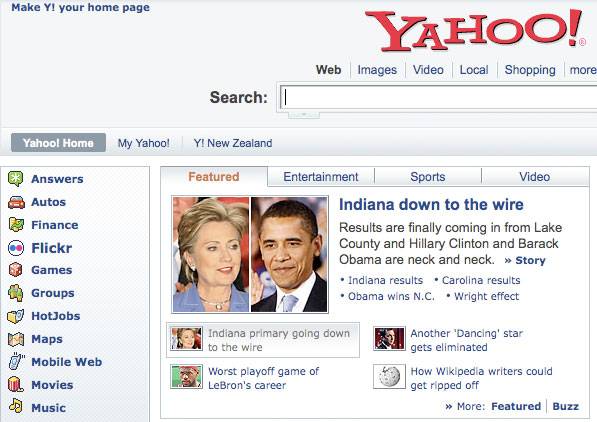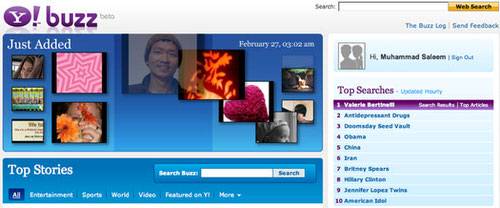Since our initial review of Yahoo! Buzz earlier this year, not much has changed about the service. At the same time, however, the perception, acceptance, and impact of the service has changed drastically. The service has shown that it can send enormous amounts of traffic (very talkative traffic), and has displaced Digg as the most active ‘social news’ community. In the process, they added widgets and rss, and most recently (and most importantly) have opened up participation to everyone.

Since they opened the submission process to everyone, the buzz surrounding the site has really been at a high. Desperate publishers and marketers who were previously locked out of the supposed ‘traffic mecca’ have joined the service in droves and have already started the practice of vote-begging in the hopes that enough votes will get them promoted to Yahoo’s main page. Here’s what you need to know about the current state of Buzz.
Note the important distinction between the Yahoo! main page and the Yahoo! Buzz main page, and the distinction between content made popular (i.e. promoted to the Yahoo Buzz main page) and Y! featured content (which is content cherry picked from Buzz to be featured on the Yahoo! main page).
ReadWriteWeb’s one (and so far only) appearance on the yahoo.com frontpage – Wikipedia story bottom right

- Yahoo! Buzz is not a social experience. The process of being featured on Yahoo! Buzz is socially driven (based on votes, shares, and search patterns), but if you consider the site’s place in the overall structure of Yahoo’s strategy, the experience isn’t social. Yahoo! Buzz is the picking ground for the content that ultimately gets featured on the Yahoo! main page, which means it is social in the exact same way Slashdot Firehose is social. Your votes may get a story to the main page of Yahoo! Buzz but after that it’s up to an editor’s judgment whether a story gets featured on the Yahoo! main page or not. So the final result, or the process of getting featured on Yahoo’s main page is not entirely social. Furthermore, there Yahoo! has turned off the comments so there are no conversations, and because there is no networking aspect to the site, there are also no relationships.
- Your votes don’t mean much. Number of votes is one of the metrics used to determine content popularity. Even then, I’ve learned that the impact of votes is arbitrary. I know people whose content was featured on the Yahoo! main page with 0 votes, and people whose content didn’t even get to the Yahoo! Buzz main page after 75 votes. The other metrics are the number of times content is shared via email and on other social sites, as well as search volume.
- Exposure is very limited, inequitably distributed. The Yahoo! Buzz main page presently is less significant than even the upcoming/most page on Digg. Although being on the page may increase your odds of catching an editor’s eye, you don’t get any exposure unless you are featured on the Yahoo! main page. Furthermore, such an insignificant number of stories cross from Yahoo! Buzz to the Yahoo! main page that for the average person, participation in the quest for exposure is an act in futility.
To summarize, Yahoo! Buzz is social insofar as a community of users gets to submit content, and vote/share it. Anything more than that, Yahoo! Buzz doesn’t do.
That said, the site also doesn’t pretend to be anything more than what it is. It doesn’t consider itself to be a competitor to other social news and networking sites, in fact it allows you to and even recommends you to share Buzzed stories on other social sites and then counts ‘shares’ as another metric to measure content popularity. As the popularity of Yahoo! Buzz grows and more people start frequenting the Yahoo! Buzz main page to read and at some future point discuss stories, that will all change. Until then, that page is just a stepping stone to the Yahoo! main page, which is the end goal.

Who should participate on Yahoo! Buzz?
From a content producer’s/publisher’s perspective, Yahoo! Buzz should without question be used by anyone publishing multiple posts a day on a site, or anyone that owns a network of blogs publishing content for different niches (heck you can automate the submission process). Networks like Hearst Digital Media and Conde Nast Publishing come to mind, but the strategy should also work for networks like Weblogs Inc. and Gawker Media. From a community member’s perspective, Yahoo! Buzz’s features are so limited that they would probably appeal to someone with a passive interest in social news, or someone just entering the space and wanting to get his or her feet wet. If you are interested in making friends, participating in heated discussions, etc., look elsewhere.
What kind of content works on Yahoo! Buzz?
It’s a wry twist in the story. The people most interested in exploring Yahoo! Buzz and participating on the site are the digerati. But the kind of audience Yahoo! Buzz is designed to cultivate is quite the opposite. Before you give up in frustration, understand that the audience the site is supposed to appeal to is the same audience for the Yahoo! portal for news and entertainment. That’s why you won’t see a lot of insider Silicon Valley news featured and instead you’ll see content from mainstream news outlets (a lot of syndicated content from Yahoo! News) about mainstream news events or entertainment.
What’s the future of Yahoo! Buzz
Yahoo! Buzz is an interesting service because it has become an awkward balance between social news and mainstream news, where some of the basic social news and networking elements are intentionally missing. At the same time, it is also interesting because although the site made some buzz for supposedly dethroning Digg, the prevailing social news champion, the site doesn’t compete with it and is not cannibalizing the social news audience. If anything, people who use Yahoo! Buzz may very well over time switch to sites with more robust social news and networking capabilities.
This is a guest post by Muhammad Saleem, a social media consultant and a top-ranked community member on multiple social news sites. You can follow Muhammad on Twitter.










